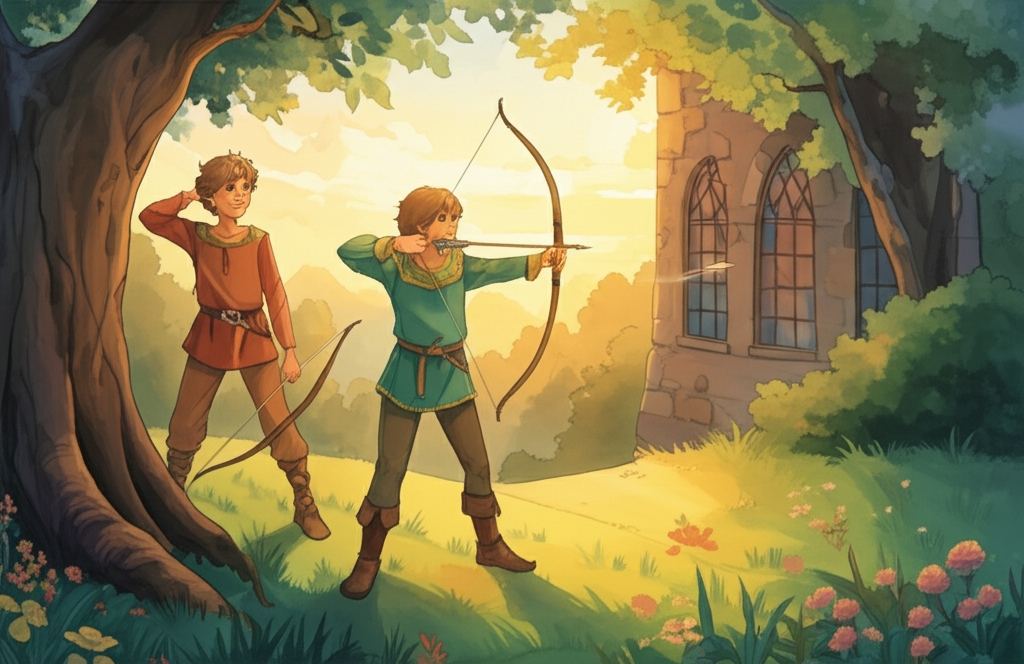
Once upon a time, a young prince was practicing his archery with his best friend, who was the son of the king’s helper. They were shooting arrows, when one of them accidentally hit a merchant’s wife. She was in a room high up in her house, looking out the window.
The prince was aiming at a bird on the window, and he didn’t know anyone was there. If he had, he would have never shot that way! So, without realizing what happened, the prince and his friend walked off. The friend was teasing the prince for missing the bird.
Later, the merchant went to check on his wife and found her lying on the floor, looking like she was dead. An arrow was stuck in the ground close to her head! The merchant thought she was gone, so he ran to the window and yelled, “Thieves! Thieves! They hurt my wife!” Soon, neighbors came running, and the servants rushed upstairs to see what was wrong. Luckily, the wife had only fainted, and the arrow just scratched her chest.
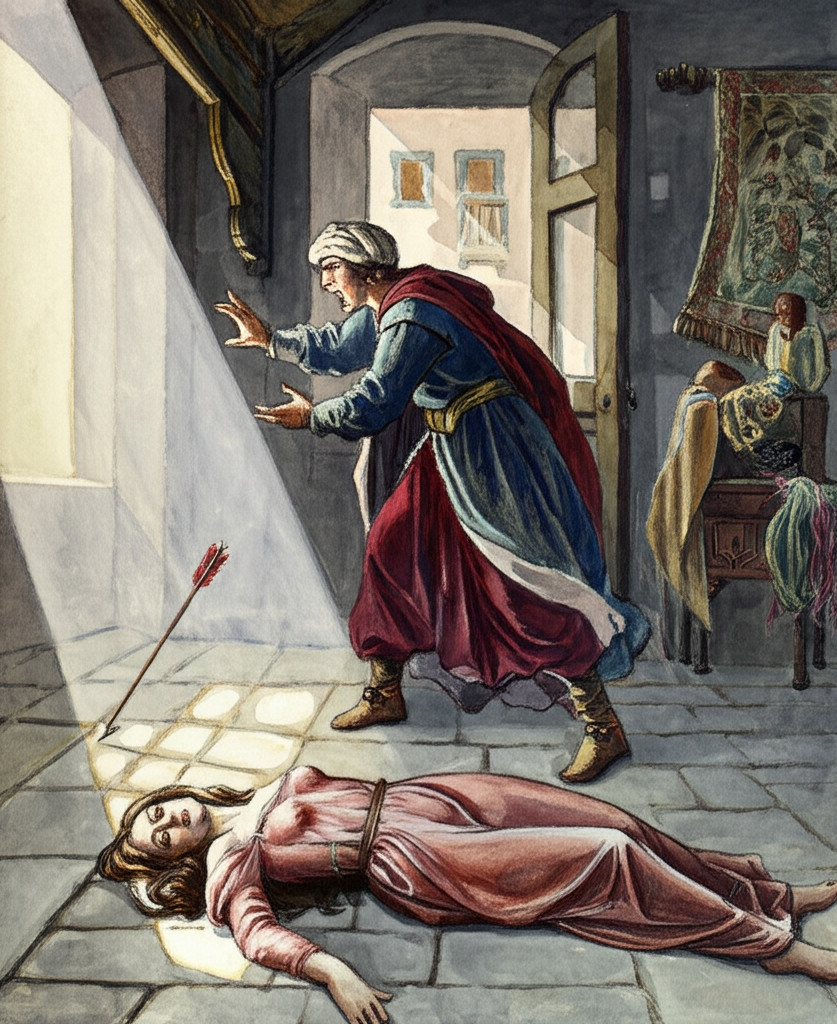
When the wife woke up, she told everyone that two young men with bows and arrows had walked by. She said one of them aimed right at her while she stood at the window!
Hearing this, the merchant went straight to the king and told him everything. The king was super angry that someone would do something so mean. He promised a big punishment for whoever did it, if they could find them. He told the merchant to go back and ask his wife if she could recognize the young men if she saw them again.
“Oh yes,” the wife said, “I would know them anywhere in the city!”
“Okay,” said the king when the merchant came back with the answer, “Tomorrow, all the men in the city will walk past your house. Your wife will watch from the window to find the one who did this bad thing.”
A big announcement was made about this. The next day, all the men and boys in the city, who were ten years old and older, lined up and walked by the merchant’s house. By chance, the king’s son and his friend were also there. They had been excused from the line, but they came to watch the fun.
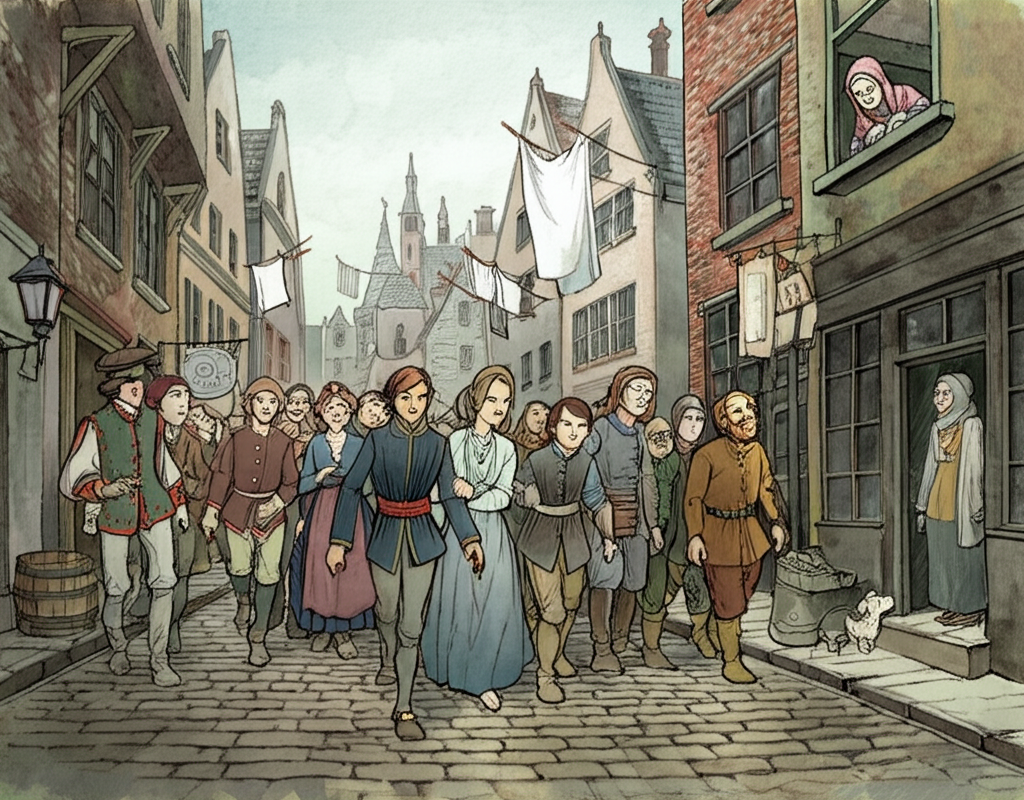
As soon as the two friends walked in front of the merchant’s window, the wife knew who they were. She told the king right away.
“My own son and the son of my best helper!” cried the king, who had been watching everything. “What a bad example for everyone! They both deserve a big punishment!”
“Please, your Majesty,” said the king’s helper, “Let’s find out exactly what happened. How did this happen?” he asked the two young men. “Why did you do such a cruel thing?”
“I shot an arrow at a bird on the window of that house, but I missed,” said the prince. “I guess the arrow hit the merchant’s wife. If I knew she or anyone was there, I would have never shot that way!”
“We will talk about this later,” said the king. “Everyone, you can go home now. We don’t need you anymore.”
That night, the king and his helper talked for a long time about what to do with their sons. The king wanted both of them to have a big punishment. But the helper said maybe the prince should just leave the country. Finally, they agreed on that.
So, the next morning, some soldiers took the prince out of the city. When they got to the edge of the country, the prince’s friend ran up to them. He brought four bags of shiny coins on four horses. “I came because I can’t let you go alone,” he said, hugging the prince. “We have always been together, so we will leave together, and we will stay together. Please don’t send me back, if you like me.”
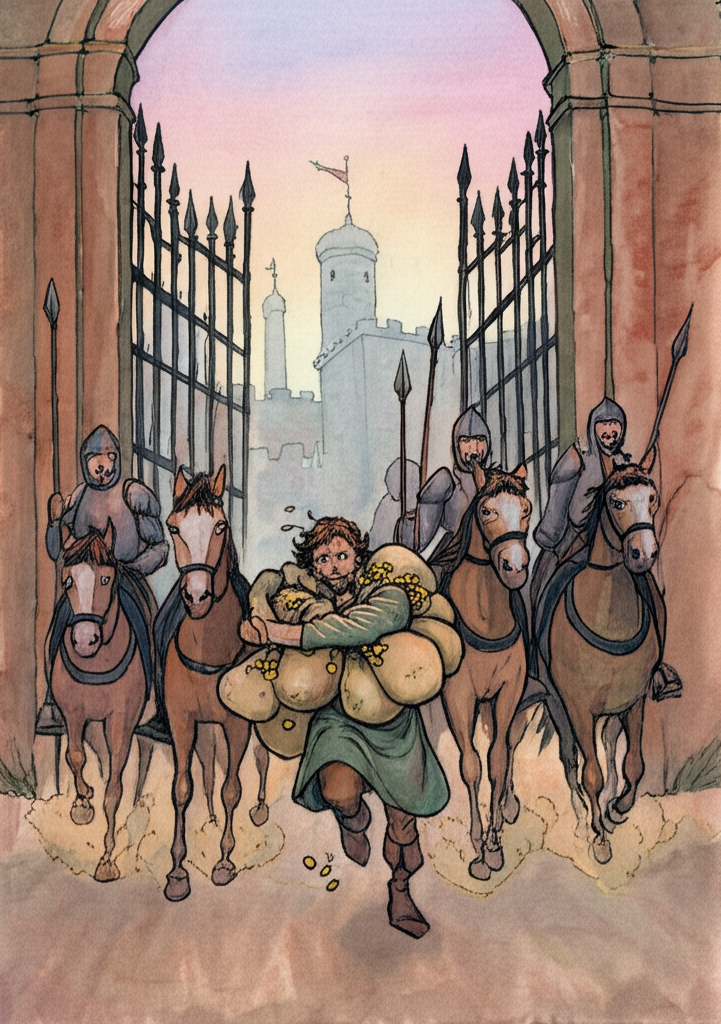
“Think about what you are doing,” the prince said. “Things might be hard for me. Why should you leave your home to be with me?”
“Because I like you,” he said, “and I will never be happy without you.”
So, the two friends walked together, holding hands, trying to leave the country as fast as they could. The soldiers followed behind with the horses and the coins. When they reached the edge of the king’s land, the prince gave the soldiers some gold and told them to go back. The soldiers took the money and hid behind some rocks to make sure the prince wasn’t coming back.
The friends kept walking until they came to a small village. They decided to sleep under a big tree. The prince started a fire and set up their beds, while the friend went to get food from the shops. But for some reason, he took a long time. After waiting for a while, the prince got worried and walked around.
He found a pretty little stream nearby. He heard that the water came from a lake close by, so he went to find it. The lake was beautiful, covered with flowers. The prince sat down and took some water in his hand to drink. But before he drank it, he saw something amazing in the water - a picture of a beautiful fairy! He looked around to see if she was really there, but he didn’t see anyone. So, he drank the water and took some more. Again, he saw the fairy in his hand. This time, he saw her sitting on the other side of the lake! He liked her so much that he fainted.
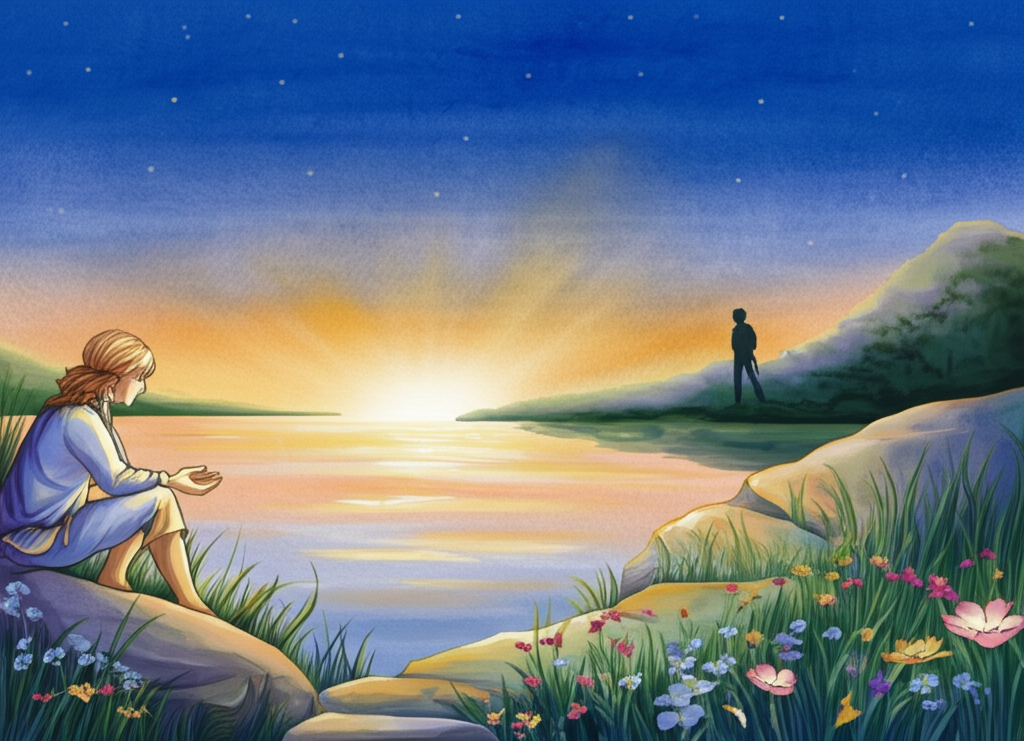
When the friend came back, he saw the fire, the horses, and the coins, but he couldn’t find the prince. He waited, then shouted, but no one answered. So, he got up and went to the stream. He saw the prince’s footprints and followed them to the lake. He found the prince lying on the ground, looking like he was dead.
“Oh no!” he cried. He lifted up the prince and splashed water on his face. “Oh, my friend, what’s wrong? Please don’t leave me! Talk to me!”
After a few minutes, the prince woke up and looked around.
“Thank goodness!” said the friend. “But what happened, brother?”
“Go away,” said the prince. “I don’t want to talk to you or see you. Go away.”
“Come on, let’s leave this place. I brought some food and horses. Let’s eat and go.”
“Go alone,” said the prince.
“Never,” said the friend. “What happened to make you not like me? A little while ago, we were best friends, but now you don’t want to see me.”
“I saw a fairy,” said the prince. “I only saw her face for a moment, because when she saw me looking, she covered her face with flower petals. Oh, she was so pretty! And she showed me a little box. Then I fainted. Oh! If you can get me that fairy to be my wife, I will go anywhere with you.”
“Oh, friend,” said the friend, “You really did see a fairy. She must be a very special fairy! That’s Gulizar from the Ivory City! I know because of what she did. Covering her face with flowers tells me her name, and showing you the box tells me where she lives. Be patient, and I will help you marry her.”
When the prince heard this, he felt much better. He got up, ate some food, and went away happily with his friend.
On their way, they met two men. These men were part of a family of robbers. There were eleven of them. A sister stayed home to cook, and the ten brothers went out in pairs. They walked in different directions, looking for people to rob. If someone was too strong, they would invite them to their house, where the whole family would attack and steal their things. The robbers lived in a tall tower with strong rooms and a big hole underneath, where they threw the people they hurt.
The two men walked up to the friends and asked them to stay at their house for the night. “It’s getting late,” they said, “and there are no other villages nearby.”
“Should we go, brother?” asked the prince.
The friend didn’t like the idea, but the prince was tired. He thought his friend was just being picky, so he said, “Okay. It’s nice of you to ask us.”
So, all four of them went to the robbers’ tower.
The two friends sat in a room with the door locked. They were worried.
“It’s no use being sad,” said the friend. “I’ll climb to the window and see if we can escape. Yes!” he whispered. “There’s a ditch below, with a tall wall around it. I’ll jump down and look around. You stay here and wait for me.”
Soon, he came back and said he saw a very ugly woman, who must be the robbers’ helper. She said she would let them go if the prince promised to marry her.
So, the woman led them out of a secret door.
“But what about the horses and our things?” asked the friend.
“You can’t take them,” said the woman. “If you go out any other way, you’ll be in big trouble.”
“Okay, they’ll go out this way too. I have a magic spell that can make them thin or fat.” The friend brought the horses without anyone seeing. He said the spell, and they went through the narrow door like pieces of cloth. When they were outside, he made them normal again. He got on his horse and held the rope of another horse. Then he told the prince to do the same. The prince jumped on a horse with the woman behind him.
The robbers heard the horses and ran out, shooting arrows at the prince and his friends. One arrow hit the woman, so they had to leave her behind.
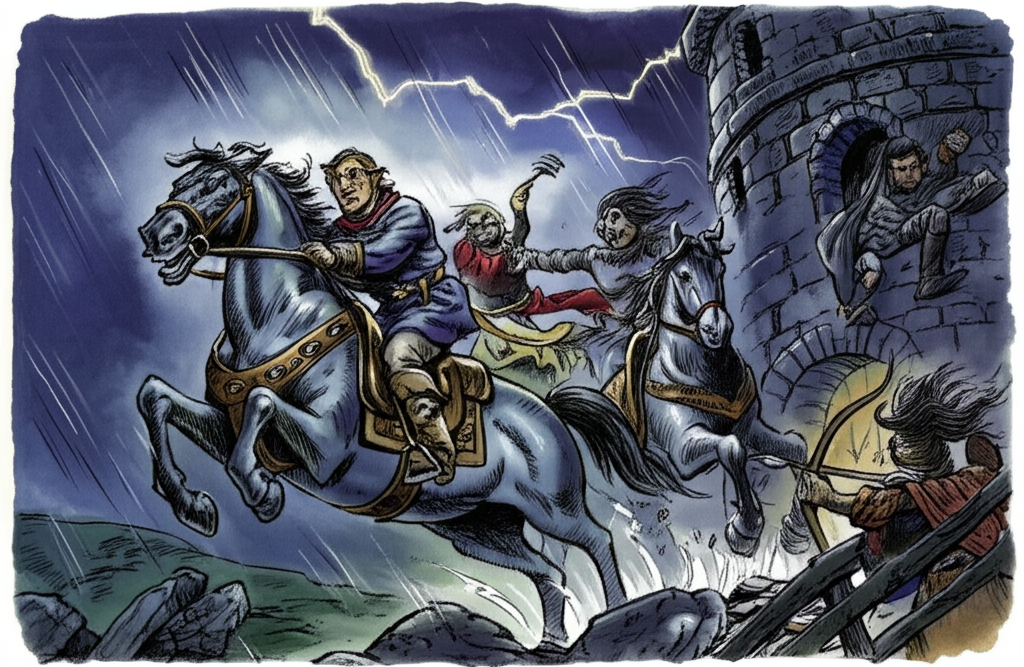
They rode away until they reached a village, where they stayed the night. The next morning, they asked everyone they met how to get to Ivory City. Finally, they found the famous city. They stayed in a small hut that belonged to an old woman. They trusted her, so they could be safe and comfortable.
At first, the old woman didn’t want them there. But the prince dropped a shiny coin into her water cup, and the friend gave her another coin. She quickly changed her mind and said they could stay for a few days.
When she finished her work, the old woman sat down with them. The friend pretended he didn’t know anything about the city. “Does this city have a name?” he asked.
“Of course, silly! Every village, especially a big city like this, has a name!”
“What’s the name of this city?”
“Ivory City! Don’t you know that? I thought everyone knew that!”
When he heard the name Ivory City, the prince sighed. The friend just looked at him, like “Be quiet! Don’t give away our secret!”
“Is there a king here?” the friend asked.
“Of course! And a queen, and a princess!”
“What are their names?”
“The princess’s name is Gulizar, and the queen’s name is…”
The friend interrupted the old woman and looked at the prince, who was staring like crazy. “Yes,” he said to him later, “We’re in the right place! We will see the beautiful princess!”
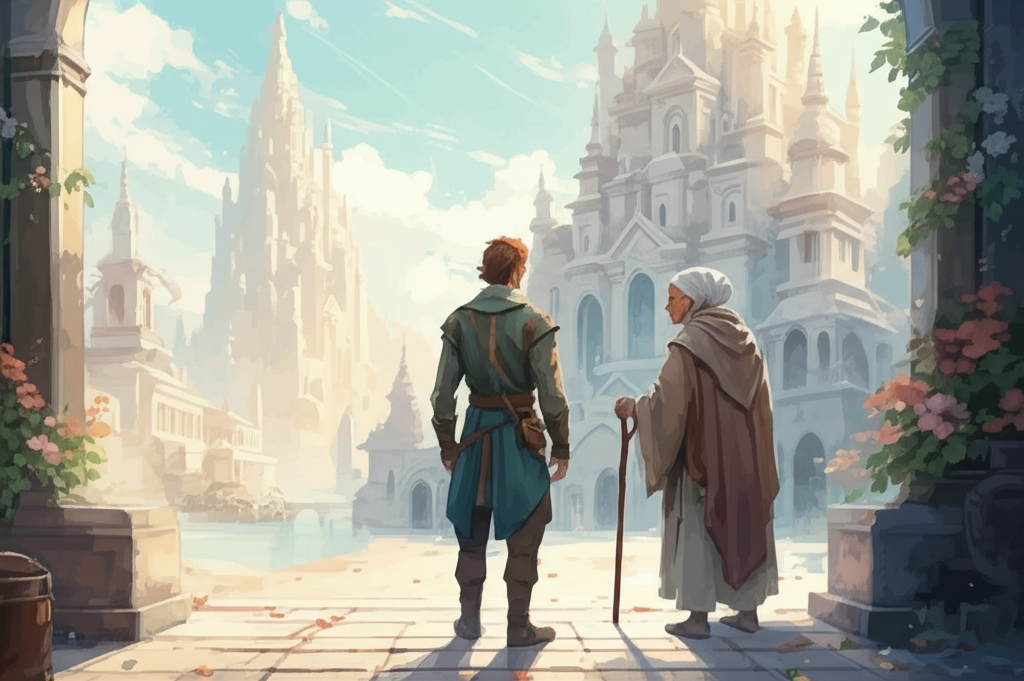
One morning, the friends saw the old woman getting ready very carefully. She was doing her hair and putting on her clothes just right.
“Who’s coming?” asked the friend.
“No one,” said the old woman.
“Then where are you going?”
“I’m going to see my daughter. She works for Princess Gulizar. I see her and the princess every day. I would have gone yesterday, but you were here and took up all my time.”
“Oh! Be careful not to talk about us where the princess can hear you.” The friend asked her not to talk about them, hoping that she would anyway, so the princess would know they were there.
When she saw her mother, the girl pretended to be angry. “Why haven’t you come for two days?” she asked.
“Because,” said the old woman, “Two young men, a prince and the son of someone important, are staying at my hut. They need so much attention! It’s nothing but cooking and cleaning all day long! And they’re very strange. One of them even asked me the name of this country and the king! They must be from far away. But they are rich. They give me a shiny coin every morning and every evening.”
After that, the old woman told the princess almost the same things. The princess got angry and told her not to talk about the strangers anymore.
That evening, when the old woman came back, she told the friend how sorry she was that she broke her promise, and how the princess hit her for mentioning them.
“Oh no!” said the prince, who was listening closely. “How angry will she be when she sees a man?”
“Angry?” said the friend. “She would be very happy to see a man! I know it! She’s asking you to go see her soon.”
“Thank goodness!” said the prince.
The next time the old woman went to the palace, Gulizar told one of her servants to run into the room while she was talking to the old woman. The servant was supposed to say that the king’s elephants were running wild through the city, destroying everything.
The servant did it, and the old woman got scared that the elephants would push down her hut and hurt the prince and his friend. She begged the princess to let her go home. Gulizar had a magic swing that could take anyone anywhere they wanted to go. She told a servant to bring it. When it came, she told the old woman to get in and wish to be at home.
The old woman did, and she was carried through the air quickly and safely to her hut. She found the prince and his friend safe and sound. “Oh!” she cried, “I thought you would both be hurt by now! The elephants are loose! I was worried about you. So the princess gave me this magic swing to come back in. But come on, let’s go outside before the elephants come and knock down the place!”
“Don’t believe it,” said the friend. “It’s just a trick. They’re playing games with you.”
“You’ll get what you want soon,” he whispered to the prince. “These are good signs.”
Two days later, the prince and his friend got in the swing and wished to be in the palace grounds. In a moment, they were there! And there was the princess, waiting for them by the gate!
Oh, what a happy meeting!
“Finally,” said Gulizar, “I have seen my love, my husband.”
“Thank you so much for bringing me to you,” said the prince.
The prince and Gulizar made promises to each other and said goodbye, one going to the hut and the other to the palace. They were both happier than ever before.
From then on, the prince visited Gulizar every day and came back to the hut every night. One morning, Gulizar asked him to stay with her forever. She was always scared that something bad would happen to him. She couldn’t live without seeing him.
The prince said there was no need to be scared. He said he should go back to his friend at night, because his friend had left his home and risked his life for him. And without his friend, he would have never met her.
Gulizar agreed for now, but she decided to get rid of the friend as soon as she could. A few days later, she told one of her helpers to make a special rice dish with a secret poison. She said to put the lid on tight, so the poisonous air wouldn’t escape. When the dish was ready, she sent it to the friend with this message: “Gulizar, the princess, sends you this in memory of her dead uncle.”
When the friend got the gift, he thought the prince had told the princess nice things about him, so she was being nice to him. He sent his thanks back.
When it was time for dinner, he took the rice dish and went to eat it by the stream. He took off the lid and set it on the grass. Then he washed his hands. In the minute or so he was washing, the green grass under the lid turned yellow! He was shocked! He thought there might be poison in the dish. He threw some to the birds nearby. The birds ate it and fell down dead!
“Thank goodness!” said the friend, “I almost died!”
When the prince came back that evening, the friend was quiet and sad. The prince asked what was wrong. “Is it because I’m at the palace so much?” The friend realized the prince didn’t know about the dish, so he told him everything.
“Look,” he said, “This is some rice the princess sent me. It’s full of poison! Thank goodness I found out in time!”
“Oh, brother! Who could have done this? Who wants to hurt you?”
“Princess Gulizar. Listen. Next time you go see her, take some snow with you. Put a little in your eyes to make you cry. Gulizar will ask why you’re crying. Tell her you’re sad because your friend died suddenly. Also, take this wine and this shovel. When you pretend to be sad, tell the princess to drink some wine. It’s strong and will make her fall asleep. Then, while she’s sleeping, heat up the shovel and make a mark on her back. Remember to bring back the shovel, and also take her pearl necklace. Then come back. Don’t be scared to do this, because it’s important for your happiness. I will make sure your marriage to the princess is okay with her father and everyone.”
The prince promised to do everything his friend said. And he did.
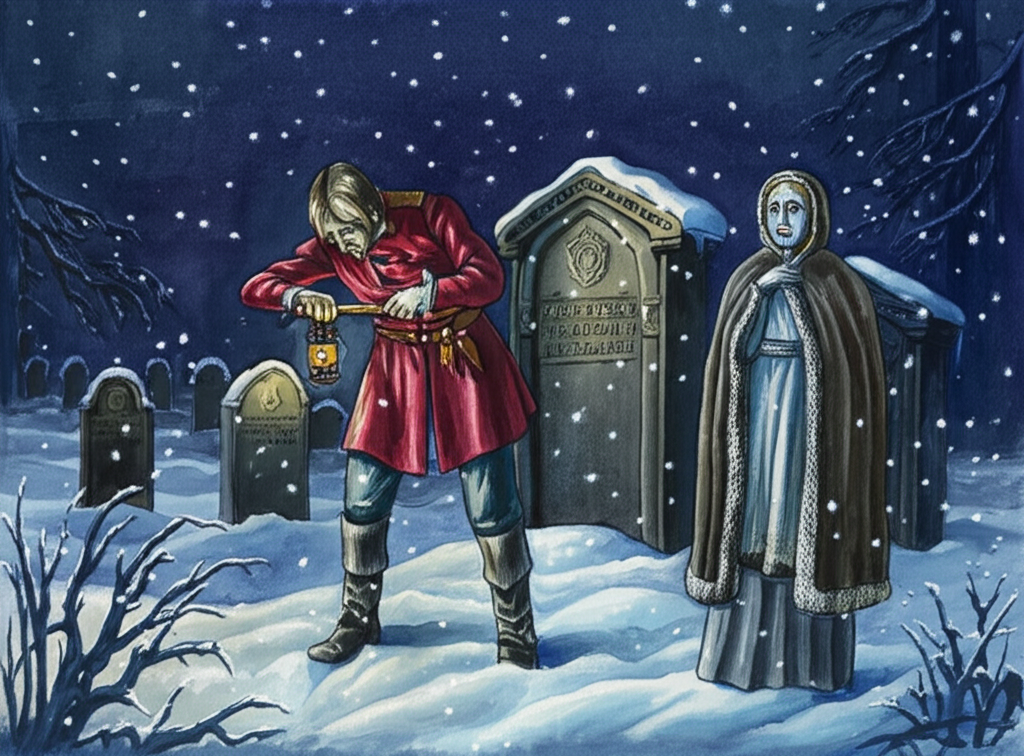
The next night, when the prince came back from visiting Gulizar, he and his friend took the horses and coins to a graveyard nearby. The friend would pretend to be a holy man, and the prince would be his helper.
In the morning, when Gulizar woke up, her back hurt, and her necklace was gone. She told the king about the necklace, but she didn’t say anything about her back.
The king was very angry and announced it to the whole city.
“Good,” said the friend when he heard this. “Don’t worry, brother. Take this necklace and try to sell it.”
The prince took it to a jewelry maker and asked him to buy it.
“How much do you want?” asked the man.
“Fifty thousand coins,” said the prince.
“Okay,” said the man, “Wait here while I get the money.”
The prince waited until the jewelry maker came back with the police! They arrested the prince for stealing the princess’s necklace.
“How did you get the necklace?” asked the police.
“A holy man, who I help, gave it to me to sell,” said the prince. “I can show you where he is.”
The prince led the police to his friend, who was sitting with his eyes closed, praying. When he finished, the police asked him how he got the necklace.
“Call the king,” he said, “I will tell him.”
So some men went to the king and told him what the holy man said. The king came. He saw the holy man praying and didn’t want to make him angry. So he put his hands together and asked, “How did you get my daughter’s necklace?”
“Last night,” said the holy man, “We were sitting here, when a monster, dressed like a princess, came and dug up a body from the grave and started eating it. I got angry and hit her with a shovel. Her necklace fell off. You don’t believe me, but it’s true. Look at your daughter. She has a burn mark on her back. If it’s true, send the princess to me, and I will punish her.”
The king went back to the palace and told them to check the princess’s back.
“It’s true,” said the helper. “She has a burn mark.”
“Then punish her right away!” yelled the king.
“No,” they said. “Let’s send her to the holy man who found out about this. He can do whatever he wants with her.”
The king agreed, so the princess was taken to the graveyard.
“Put her in a cage near the grave,” said the holy man.
So they did, and soon the holy man, his helper, and the princess were alone in the graveyard. When it got dark, the holy man and his helper took off their costumes. They took their horses and things and went to the cage. They let the princess out, put special cream on her back, and put her on a horse behind the prince. They rode away fast, and by morning, they were safe and could talk.
The friend showed the princess the poisoned rice dish she sent him and asked if she was sorry for what she did. The princess cried and said he was her best friend and helper.
A letter was sent to the king’s helper, telling him everything that happened to the prince and his friend since they left the country. When the king’s helper read the letter, he told the king. The king sent a letter back to the two friends, telling them not to come back yet. He said to write a letter to Gulizar’s father and tell him everything.
So they did. The prince wrote what his friend told him to.
When Gulizar’s father read the letter, he got angry at his helpers for not finding the prince and his friend. He really wanted them to like him. He said he would punish some of his helpers on a certain day.
“Come,” he wrote back to the friend, “And stay at the palace. And if the prince wants, I will help him marry Gulizar as soon as possible.”
The prince and his friend were happy to accept the invitation. They were welcomed by the king. The wedding happened soon after. After a few weeks, the king gave them horses, elephants, jewels, and clothes. He told them to go back to their own land, because he knew the king would be happy to see them.
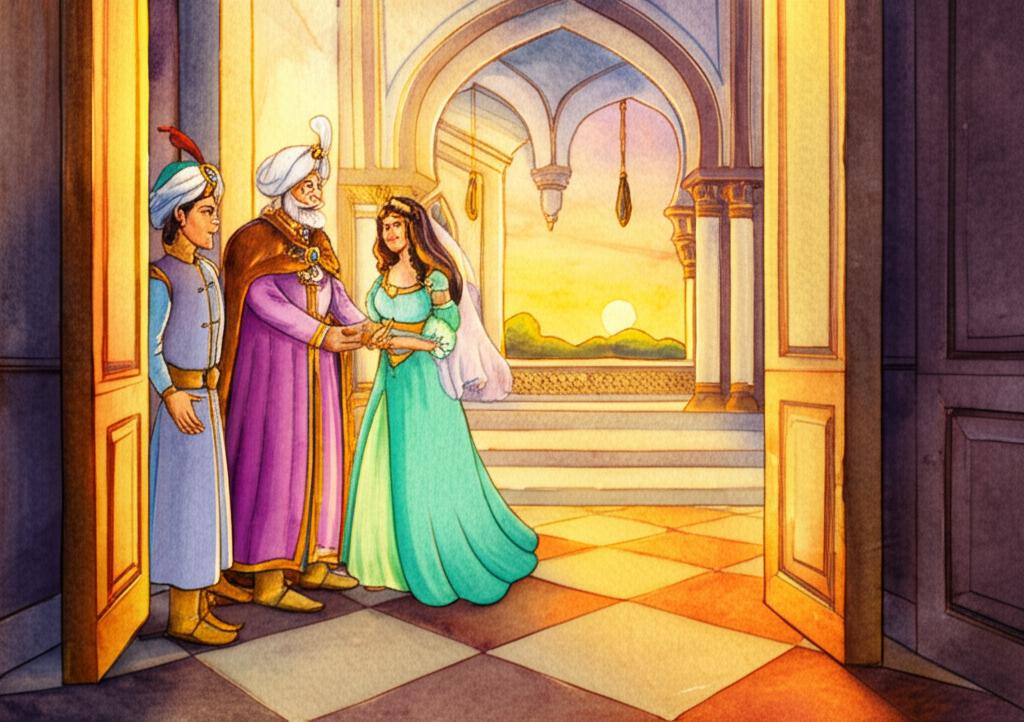
The night before they left, the king’s helpers, who were going to be punished, came and begged the friend to help them. They promised to give him their daughters to marry. He agreed, and he helped them get forgiven.
Then the prince, with his beautiful wife Gulizar, and his friend, with soldiers and lots of camels and horses carrying treasure, left for their own land. On the way, they passed the robbers’ tower. With the help of the soldiers, they knocked it down, hurt all the robbers, and took the treasure they had been collecting for years.
Finally, they reached their own country. When the king saw his son’s beautiful wife and all their treasure, he was happy and told them to come into the city.
From then on, everything was happy for the prince. He became a favorite and later became king. He ruled the country for many years in peace and happiness.